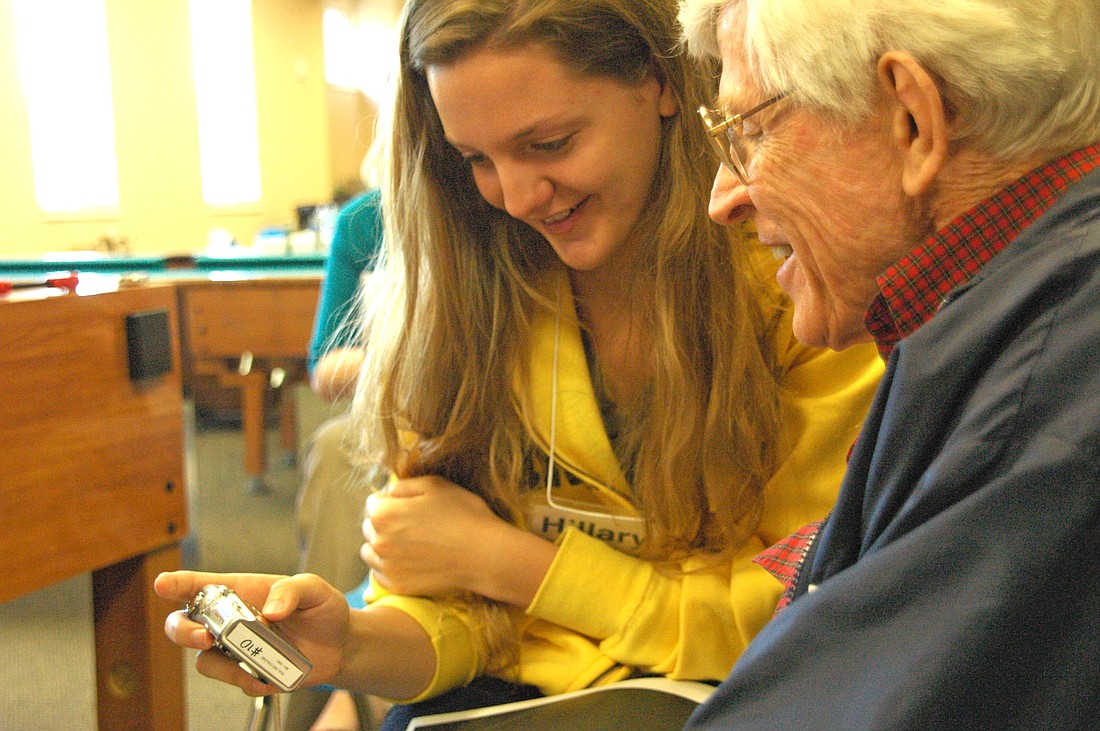- April 24, 2024
-
-
Loading

Loading

As the man looks at the photo of the young woman on the screen, he thinks nothing. He doesn’t know her.
Some students say, “that’s your daughter,” up there, but he resists, quietly uncertain. They point to the printout of the very same photo in his hands, telling him again.
Recognition maybe, but memories certainly, come to him. That’s her, he remembers, he knows her name and little things about her.
This man has dementia, and he’s one of Winter Park’s Brain Fitness Club members. He and a dozen others with Alzheimer’s or some type of dementia gather at the First United Methodist Church in Winter Park two days a week to exercise their minds and bodies. Director Peggy Bargmann, a registered nurse who has specialized in dementia for 25 years, partnered with the University of Central Florida communicative sciences and disorders masters program to form the Club in 2007. They offer brain building, physical exercise, friendship and speech therapy.
Prompting conversation
Now, for the first time, once a week, they meet with Rollins College freshman students for a photography class. The students and Brain members each have an assignment to complete, and then they discuss their photos in class.
“We’re trying to make that connection,” Rollins student David Cottrell said. “When you look at a photo, it brings you back to that moment.”
For the members with dementia, that moment might not be exactly what’s in the photo they discuss with the students that week. Sometimes they don’t remember taking the picture, but the photo almost always sparks some memory or conversation.
“Creative and critical thinking will help anyone in terms of their brain activity,” said Dawn Roe, professor of the photograph-as-language course.
Talent revealed
For more information about the Brain Fitness Club, contact Peggy Bargmann at 407-927-4380 or email [email protected]. The Club is done on a semester basis, with the photography class possibly coming back next fall. The cost of a 14-week semester is $1,000, but there are scholarship opportunities.
The Brain Fitness members and students work in small and large groups, discussing what they see in the photos, the feelings they bring up and what they hope others might think or wonder. Then they all come together to talk about a few featured photos. There is one of a book on a table, and they muse about where it might have been taken, at what angle, and how pretty the light hits the items sitting there. Another featured is one of the members taking a photo of himself in a mirror. They discuss contrast, light and dark. While some of the young students’ attentions wander, the members are completely engaged. These sophisticated trains of thought and talk take focus and attention, and that’s a great brain workout, Bargmann said.
“A lot of [the photos] are remarkable … there is clarity and thought at the moment they take the photo,” Roe said.
Restoring worth
Many members take photos they’re very proud of. One member shows pictures of a beautiful sunset he’s taken in his backyard, which faces a lake. The colors, pink and yellow, gleam off the water. He shows them to everyone each week. The member who took a photo of himself in the mirror takes the assignments very seriously, and has a lot of talent, Bargmann said.
“He is a man living with dementia, living with so many losses, and now, here’s a new skill he has,” she said. “You want a sense of worth and this certainly does that.”
The students have learned to see that, too, with seniors struggling against losing abilities.
“It’s very frustrating for them,” Cottrell said. “Something that was so easy all of a sudden is out the window.”
Learning from each other
And it wasn’t easy for the students at first, either. Many were surprised to hear they would be working with the Brain Fitness Club. In the beginning, members didn’t remember them; now they know their names. While the room was once quiet, now it whispers with friendly talk. Student Brad Baker said he’s learned so much from the members, not just about the disease itself, but about history and life, too. It’s a place for them to feel safe and accepted.
“I feel like that’s mostly what we’re here for, to listen to what they have to say,” Baker said.
And even though this class is no miracle cure, the students said they have a strong feeling that it is helping, somehow.
“I feel like our time here isn’t really wasted … whether it’s big or small it’s still making an impact,” Cottrell said.
Bargmann hears it — after the class, the members tell her that going there two days a week makes a difference in their lives; they say it’s important to them, that they can focus just a little bit better.
“Whether we can measure that or not, it’s the feeling,” Bargmann said. “They feel hope.”